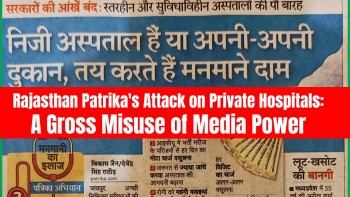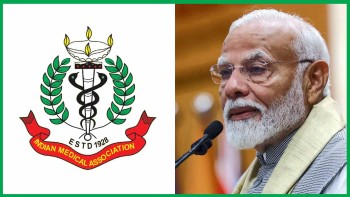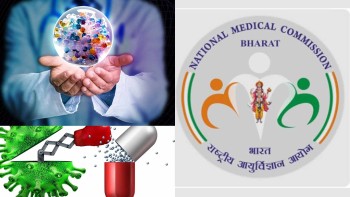In the judgment delivered on 27th Dec 2023 the NCDRC has upheld the decision of the state comission in which the commission had found treating Gynecologist and hospital guilty of medical negligence and deficiency in service at the time of the birth of a child resulting in permanent disability to the child.
State commission had ordered the doctor and hospital to pay Rs. 50 Lakh as compensation with 9% interest on the amount of Rs. 50 lakhs from the date of presentation of the complaint i.e. 29.10.2003.
The brief facts of the case,
As per the complainant, on 08.06.2001, patient, the wife of the complainant, who was pregnant, sought medical consultation with OP-2, a Gynecologist at the Hospital of OP-1. Subsequently, she continued consulting OP-2. On 23.10.2001, she expressed concern as regards to decreased fetal movements. However, OP-2 reassured her that this was within the normal spectrum. On 29.10.2001, she was admitted for delivery and was expected to have normal delivery. Yet, as the umbilical cord was wrapped around the child's neck during delivery, there was an impediment in receiving adequate oxygen, resulting in post-birth convulsions. The child received inadequate care at the hospital and was discharged. Following this, the complainant sought additional medical attention, consulted a pediatrician and a physiotherapist. A subsequent CT scan revealed that the child was afflicted with 'Cerebral Palsy', as the OPs failed to take due care in the delivery and after the child suffered the disease. Being aggrieved by the medical negligence and deficiency in service of the OPs, the complainant filed a complaint before the State Commission and sought Compensation of Rs.55,66,000/- from Opposite Parties on various heads.
The OPs in their reply before the State Commission contended that the complainant's wife initially consulted Doctor (OP-2) on 08.06.2001. Despite being advised sonography on 23.10.2001, she did not undergo the same. On 29.10.2001, she was admitted for delivery and successfully delivered a male child at 3.34 PM, receiving appropriate care throughout and supervised by OP-2 and resident doctors. They refuted the claim of a cord around the child's neck, stating that the child was cared for immediately, receiving oxygen when required. Post-delivery, the child was moved to the pediatric care unit for further treatment. The OPs denied any medical negligence. Attributing the child's condition, diagnosed with 'Cerebral Palsy,' to a genetic birth defect they highlighted that the child received care under the guidance of the pediatrician, hence the claim should be dismissed.
Also read-
Admission made at Institutional level in MBBS Course for Academic Session 2023-24 will be Cancelled after verification" NMC
Opinion of Medical Board- A medical board comprising of five senior doctors of a government medical college gave the opinion that- " The child is- suffering from spastic quadriplegia-global development delay-impaired vision-secondary epilepsy with under-weight On the basis of history, examination and investigations it is possible that his condition may be due to birth asphyxia related cerebral damage, but the available information is inadequate to conclusively rule out an underlying genetic pre disposition to birth asphyxia or cortical atrophy or congenital viral infection resulting in such a condition."
The State Commission allowed the complaint and accepted that the newborn had suffered cerebral palsy due to negligence of the doctor and the hospita and for whole life he is in constant need of an attendant.The order by the commission mentioned that, "No money can compensate for the suffering and helplessness of the child and trauma and mental agony of the parents. The quality of life of the family members have spoiled forever and the child has suffered permanent disability. Further looking at the facts that the child could not lead a normal life and parents have also suffered the pain and agony and constant trauma the child is not able to perform his daily chores."
Also read-
Patient died during Laparoscopic Dye Test, Compensation of 1.25cr awarded against the Hospital for Deficiency in Services
The commission ordered that an amount of Rs. 50 lakhs shall be paid to the complainant as compensation with 9% interest on the amount of Rs. 50 lakhs from the date of presentation of the complaint i.e. 29.10.2003.
Aggrieved by the order of the State Commission, both the parties i.e., the complainant and the OPs filed appealed before NCDRC.While the complainant wanted the compensation to be reevaluated and enhanced,the doctor and the hospital wanted the order of the state commission be set aside.
In the appeal the complainant reiterated the issues raised in the complaint before the State Commission and contended that the order needs to be modified .
It was claimed by the complainant that-
01.There was carelessness in treatment as well as in the daily medical record wherein the OPs indulged in overwriting and tampering with records.
02. The hospital staff tempered with doses of Syntocinon. Overwriting and cutting was there at various places where syntocinon related advice is given.
03. The reason for giving the said drug is not stated. Whether the given dose was clinically required or not was left ambiguous or suspicious. This arises out of overwriting and should have been justified by the OPs.
04. There was no CTG tracing done after starting the dose of oxytocin, as stated it was done at 12 PM and after 2 PM. No contractions were measured.
05. The discharge slip also has shown the child as ‘normal’. This proves that either the doctors were not proficient or there was a malafide intention to suppress the information. In either case, the hospital has shown contrarian attitude and indulged in practices of business, much against medical ethos.
Also read-
Jaipur to Host National Medicolegal Summit in April this Year
The OPs reiterated that-
01. The OP-1 (hospital) and OP-2 (doctor) were not responsible for cerebral palsy and other defects of the respondent’s child. They argued that the child was not under their continuous medical treatment during the mother’s pregnancy.
02. They were not provided with the complete medical history of the mother and the foetus. They rendered standard medical care and treatment to the mother and the child during and after the delivery, and that they were not guilty of any deficiency or negligence in service.
03. The counsel for the OP's referred to various books, articles, research papers, and affidavits that explain the causes, diagnosis, and prevention of cerebral palsy and birth asphyxia. He asserted that most cases of cerebral palsy are attributed to perinatal causes (occurring during pregnancy before delivery) and not to intrapartum asphyxia (occurring during labour and delivery). He urged that the child’s brain damage and other defects were likely to be due to some genetic or developmental disorder, and not to any lack of oxygen supply during or after birth. He challenged the State Commission’s findings and conclusions and asserted that it had erred in quoting Williams, 24th Edition, and in disregarding the medical tests and prescriptions by independent centres and experts. The State Commission failed to consider the medical evidence and documents submitted, made erroneous presumptions and assumptions based on their non-availability. It ignored or misinterpreted various medical reports, documents, and affidavits that supported their case and contradicted the claim of the complainant for medical negligence. He alleged that the State Commission prejudged the case and violated the principles of natural justice and Article 14 of the Constitution.
04.The OPs asserted that they provided the best possible care to the Respondent's wife and child, and that the child's condition was not caused by post-delivery lack of oxygen supply, but due to complex multifactorial processes involving genetic, physiological, environmental, and obstetrical factors. They did not follow their advice to undergo certain tests and did not have faith in the hospital and its staff.
Also read-
Twelve Duties of Doctors Towards Their Patients
Order by NCDRC
NCDRC observed that-
01.Despite seeking permission to submit documents to support their arguments, the OPs failed to submit the record which was in their custody only.
02. Discharge summary of the child showed when he was recieved in Pediatric care his heart rate was 100 per minute and bag and mask ventilation was given while the Gynecologists statement was that everything was normal till the birth.
03. While OP-2 has stated that after CT scan it was found that cortex of the child is not developed. However, no CT Scan report was produced to support the stand.
04. The evidence submitted by OP-2 before the State Commission was very limited and no further evidence was led even after necessary permission was granted for producing additional evidence.
05. It is also the contention of the OP-2 that up to 3.15 PM on 29.10.2001, there was no fetal distress. However, if there was no fetal distress as per her own admission and everything was normal, it certainly cannot be the diagnosis of OP-2 that fetus is suffering from any abnormality. On the other hand, the complainant has led evidence that, at the time of the birth, if heartbeat of a child is 100 and he is gasping (which was the case), it shows the lack of oxygen and fetal distress.
06. Admittedly, while all documents in relation to treatment of the child from his birth till the discharge are with the OPs, no significant records were produced to assert their contentions.
"Therefore, the allegation of negligence in the treatment subsists.",ordered NCDRC.
Dr Gaurav Aggarwal, Medicolegal Expert & Lawyer says that important issues to consider through this judgment are-
01.Whether contributory negligence (negligence of the patient along with the negligence of the treating doctor/hospital) is a good defense in court?
2. Whether weaknesses/deficiencies in record keeping or inability to produce records by the doctor/hospital amounts to medical negligence?
To answer the former, contributory negligence may be a defense, but it is not a 'good defense' for the doctor or hospital. It is negligence of the hospital that is in question over here, not the negligence of the patient. The doctor cannot take the defence that "so what I'm negligent about, you (the patient) are also negligent". Such a defense is futile for the defending doctor.
To answer the latter, it is a well established principle of law ( law of precedence) that poor record keeping amounts to not only ethical negligence but also civil negligence. The court deems deficient records as negligence for a variety of reasons- records not maintained, records manipulated, records not supporting good defense of doctor and therefore not produced, records misplaced, records prove negligence, etc. It is for these reasons that poor r cords amount to medical negligence. On the other hand, if the records are nicely, timely and judiciously maintained, then it is these very records that will save the doctor in the court.
"It's an old saying that Poor record means poor defense,good record means good defense and no record means no defense", Dr Gaurav added.
Access the complete order here-
NATIONAL CONSUMER DISPUTES REDRESSAL COMMISSION NEW DELHI FIRST APPEAL NO. 733 OF 2017







Recent comments
Latest Comments section by users
Guest
Jan 11, 2024
Consumer cases taking 20 yrs is a solid reason for asking for exemption for complex cases related to medical negligence If both parties hv to wait for 20 yrs then the purpose of consumer protection act is defeated
Guest
Jan 11, 2024
प्रश्न ये भी है कि यदि 20 वर्ष पूर्व ये फैसला दिया जाता तो क्या 50 लाख कंपनसेशन दिया जाता? आप जब कंपनसेशन आज की तारीख के इनफ्लेशन रेट से दे रहे हो तो उस पर बैक डेट में ब्याज कैसे चार्ज कर सकते हो? या तो कंपनसेशन 20 वर्ष पूर्व के रेट से 5 लाख रुपए अवार्ड करो, या फिर बैक डेट में ब्याज वाला क्लॉज हटाओ।
Guest
Jan 11, 2024
कृपया कोई प्रार्थी तक मेरा ये मेसेज पहुंचाए, और उसके वकील से बात करके अपील दायर करने को कहे, धन्यवाद
Guest
Jan 11, 2024
ओरिजिनल कंप्लेंट में करीब 56लाख कंपेंसेशन मांगा गया था। वही दे दिया।